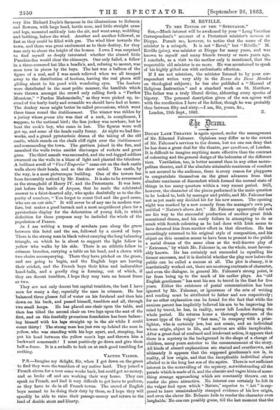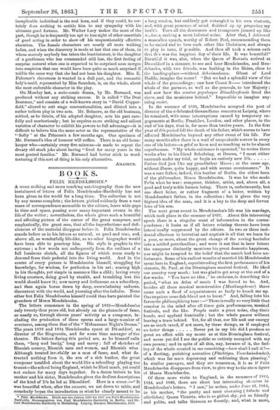th !r ma.
DRURY LANE THEATRE is again opened, under the management of Mr. Edmund Falconer. Opinions may differ as to the extent of Mr. Falconer's services to the drama, but no one can deny that he has done a great deal for the theatre, par excellence, of London. It is difficult to imagine anything more effective than the contrast of colouring and the general design of the balconies of the different tiers. Ventilation, too, is better secured than in any other metro- politan theatre, and if the absolute attainable maximum of comfort is not secured to the audience, there is every reason for playgoers to congratulate themselves on the great advances from that absolute maximum of discomfort which formed the normal state of things in too many quarters within a very recent period. Still, however, the character of the pieces performed is the main question to be looked to, both by manager and public, and Mr. Falconer has not as yet made any decided hit for his new season. The opening night was marked by a new comedy from the manager's own pen, entitled " Nature's above Art." Mr. Falconer apparently did not see his way to the successful production of another great Irish sensational drama, and his costly failure in attempting to do as much with Scotch colouring as he had done with Irish seems to have deterred him from another effort in that direction. He has accordingly returned to his original style of composition, and his object on this occasion seems to have been to present to the public a social drama of the same class as the well-known play of " Extremes," by which Mr. Falconer is, on the whole, most favour- ably known. He has certainly not succeeded in equalling bis former successes, and it is doubtful whether the play now before the public can be called a success at all. The plot is clumsy, it is inartistically worked out, there are no strong contrasts of character, and even the dialogue, in general Mr. Falconer's strong point, is far from being up to the mark of his earlier plays. An "old English gentleman" has sent his son to travel in the East for five years. Either the existence of postal communication has been ignored by Mr. Falconer, or ignorance of the arts of writing and reading must be attributed to father and son respectively; for no other explanation can be found for the fact that while the anxious parent has implicitly believed his son to be improving his mind by travel, be has, in reality, never left London during the whole period. He returns home a thorough specimen of the lowest type of the vulgar " fast man," in company with a prize- fighter, who is certainly low, but not comic, and an individual whose origin, object in life, and motives are alike inexplicable. After a great deal of confused and irrelevant action, it appears that there is a mystery in the background in the shape of a change of children, many years anterior to the commencement of the story. All kinds of absurd explanations are started and overthrpwn, and ultimately it appears that the supposed gentleman's son is, in reality, of low origin, and that the inexplicable individual above alluded to is the long lost son of the squire. There is not sufficient interest in the unravelling of the mystery, notwithstanding all the parade which is made of it, and the obscure and vague hints of some- thing strange approaching which are constantly thrown out to render the piece attractive. No interest can certainly be felt in the vulgar fool upon which " Nature," superior to " Art " is sup- posed to have unmistakeably stamped evidence of his low origin, and even the clever Mr. Belmore fails to render the character even laughable: No one can possibly guess, till the last moment that the inexplicable individual is the real hero, and if they could, he cer- tainly does nothing to entitle him to any sympathy with his ultimate good fortune. Mr. Walter Lacy makes the most of the part, though he is frequently too apt to lose sight of other essentials of good acting in order to show off his unquestionably effective elocution. The female characters are nearly all mere walking ladies, and when the discovery is made at last that one of them, in whom scarcely anybody has taken the leastinterest, is the daughter of a gentleman who has commanded still lees, the first feeling of surprise natural when one is expected to be surprised soon merges into suspicion that one would have been quite as much surprised if told in the same way that she had not been his daughter. Mrs. E. Falconer's cleverness is wanted in a dull part, and the romantic lady's-maid, represented by Miss Saunders, is, on the whole, about the most endurable character in the play.
On Monday last, a serio-comic drama, by Mr. Burnand, was produced without any striking success. It is called "The Deal Boatman," and consists of a well-known story in "David Copper- field," altered to suit stage conventionalities, and diluted into a rather tedious play in two acts. Mr. Belmore, as the old boatman, robbed, as he thinks, of his adopted daughter, acts his part care- fully and meritoriously ; but he requires more striking and salient varieties of character to exhibit his powers to full advantage—it is difficult to believe him the same actor as the representative of the " Softy" at the Princess's a few months ago. One specimen of Mr. Burnand's idea of humour will suffice. There is an old house- keeper who—certainly every five minutes—is made to repeat the dreary old stock joke about having " lived for many years in the most genteel families." Mr. Burnand had better stick to word- -torturing if this sort of thing is his only alternative.
AMATEUR.































 Previous page
Previous page